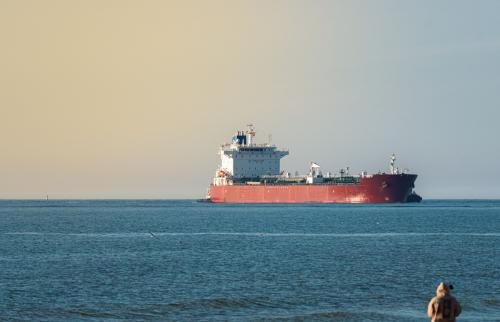The U.S. maritime transportation system plays a critical role in ensuring American economic prosperity and security, as experts discussed at a March 25 event at Brookings. With 90 percent of global trade now moving by sea, the demands on our marine transportation system are unprecedented.
Brookings Vice President and Director of the Foreign Policy program Bruce Jones hosted U.S. Coast Guard Vice Admiral Daniel Abel to give a keynote address on the Coast Guard’s recently released “Maritime Commerce Strategic Outlook.” Admiral Abel highlighted the Coast Guard’s three main lines of effort: 1) facilitating lawful trade on secure waterways; 2) modernizing aids to navigation and mariner information systems; and 3) transforming the U.S. Coast Guard capacity, workforce capacity, and partnerships.
Following Admiral Abel’s remarks, Jones moderated a conversation between Abel, Congressman John Garamendi (D-CA), Lieutenant General Todd Semonite of the U.S. Army Corps of Engineers, and Jennifer Carpenter of the American Waterways Operators. Jones highlighted three main themes: cyber, climate, and China. The discussants debated the use of advanced technologies to improve efficiency while emphasizing the importance of risk management and cyber vulnerabilities. Acknowledging changing environmental factors and risks to maritime commerce, the panelists discussed the resilience of our waterways and the fact that the Arctic—once thought inaccessible—might open to navigation. The experts debated the future of American shipping and trade given the enormous scale at which China is operating global commercial trade and the country’s bearing on ports and port infrastructure. The panelists also discussed the future of U.S. shipbuilding, maritime jobs, and the role of the Jones Act in maritime commerce.
At the end of the event, the discussants took questions from the audience.
The Brookings Institution is committed to quality, independence, and impact.
We are supported by a diverse array of funders. In line with our values and policies, each Brookings publication represents the sole views of its author(s).





Commentary
How securing maritime commerce protects U.S. national security
Experts discuss
April 1, 2019